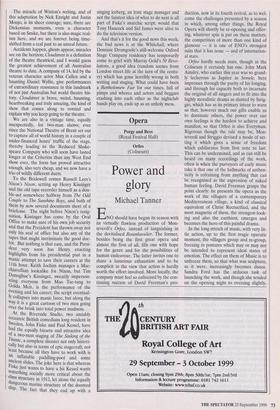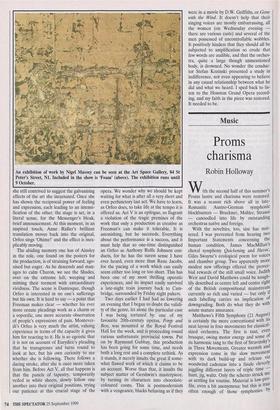Opera
Porgy and Bess (Royal Festival Hall) Orfeo (Coliseum)
Power and glory
Michael Tanner
ENO should have begun its season with its virtually flawless production of Mon- teverdi's Orfeo, instead of languishing in the devitalised Rosenkavalier. The former, besides being the first great opera and almost the first of all, fills one with hope for the genre and for the possibilities of human endeavour. The latter invites one to share a luxurious exhaustion and to be complicit in the view that action is hardly worth the effort involved. More locally, the company must feel so enlivened by the con- tinuing success of David Freeman's pro- duction, now in its fourth revival, as to wel- come the challenges presented by a season in which, among other things, the Royal Opera will shortly be re-opening and offer- ing, whatever spin is put on these matters, the competition of more than one kind of glamour — it is one of ENO's strongest suits that it has none — and of internation- al stars.
Orfeo hardly needs stars, though at the Coliseum it certainly has one. John Mark Ainsley, who earlier this year was so grand- ly lecherous as Jupiter in Semele, here impresses through the purity of his longing, and through his capacity both to incarnate the original of all singers and to fit into the highly moralistic drama as slanted by Strig- gio, which has as its primary intent to warn us that, however much our gifts enable us to dominate others, the power over our own feelings is the hardest to achieve and manifest, so that Orfeo is also Everyman. Rigorous though the tale may be, Mon- teverdi and Striggio devised a mode of set- ting it which gives a sense of freedom which exhilarates from first note to last. This can be undermined, and as can still be heard on many recordings of the work, often is when the purveyors of early music take it that one of the hallmarks of authen- ticity is refraining from anything that can be recognised as the expression of naked human feeling. David Freeman grasps the point clearly: he presents the opera as the work of the villagers of a contemporary Mediterranean village, a kind of classical equivalent of Christ Recrucified, and the most magnetic of them, the strongest-look- ing and also the earthiest, emerges and becomes the hero of this painful drama.
In the long stretch of music, with very lit- tle action, up to the first tragic operatic moment, the villagers group and re-group, freezing in postures which may or may not be intended to represent ideal states of emotion. The effect on them of Music is to unfreeze them, so that what was sculpture, as it were, increasingly becomes dance. Sandra Ford has the arduous task of launching the work, and though she tended on the opening night to oversing slightly, An exhibition of work by Nigel Massey can be seen at the Art Space Gallery, 84 St Peter's Street, NI. Included in the show is 'Foam' (above). The exhibition runs until 9 October.
she still contrived to suggest the galvanising effects of the art she incarnated. Once she has shown the reciprocal power of feeling and expression, each leading to an intensi- fication of the other, the stage is set, in a literal sense, for the Messenger's bleak, brief announcement. At this moment, in an inspired touch, Anne Ridler's brilliant translation moves back into the original, Orfeo sings `Ohimel' and the effect is inex- plicably moving.
The abiding memory one has of Ainsley in the role, one found on the posters for the production, is of straining forward, ago- nised but eager. As he descends and man- ages to calm Charon, we see the Shades, over on the extreme left, weeping and miming their torment with extraordinary vividness. The scene is Dantesque, though Orfeo is interested in no one's sufferings but his own. It is hard to say — a point that Freeman makes clear — whether his ever more ornate pleadings work as a charm or a soporific, one more accurate observation of people's expressions of pain. Montever- di's Orfeo is very much the artist, valuing experience in terms of the capacity it gives him for reacting to it. He is so egoistic that it is not on account of Eurydice's pleading that he transgresses and turns round to look at her, but his own curiosity to see whether she is following. There follows a daring stroke, after she is once more taken from him. Before Act V, all that happens is that the panels of tapestry, temporarily veiled in white sheets, slowly follow one another into their original positions, trying our patience at this crucial stage of the opera. We wonder why we should be kept waiting for what is after all a very short and even perfunctory last act. We have to learn, as Orfeo does, to take life at the tempo it is offered us. Act V is an epilogue, so flagrant a violation of the tragic premises of the work that only a production as creative as Freeman's can make it tolerable. It is astonishing, but he succeeds. Everything about the performance is a success, and it must help that so one-time distinguished an Orfeo as Anthony Rolfe Johnson con- ducts, for he has the surest sense I have ever heard, even more than Rene Jacobs, for the pacing of a work which can easily seem either too long or too short. This has been one of my most thrilling operatic experiences, and its impact easily survived a late-night train journey back to Cam- bridge, surrounded by Friday night pukers.
Two days earlier I had had so lowering an evening that I began to doubt the validi- ty of the genre, let alone the particular case I was being tortured by: one of my favourite 20th-century operas, Porgy and Bess, was mounted at the Royal Festival Hall for the week, and is proceeding round various unfortunate provincial towns. Put on by Raymond Gubbay, this production has been going for some time, and needs both a long rest and a complete rethink. As it stands, it merely insults the great if some- what flawed work of which it claims to be an account. Worse than that, it insults the subject matter of Gershwin's masterpiece, by turning its • characters into chocolate- coloured coons. This is postmodernism with a vengeance, blacks behaving as if they were in a movie by D.W. Griffiths, or Gone with the Wind. It doesn't help that their singing voices are mostly embarrassing, all the women (on Wednesday evening there are various casts) and several of the men possessed of uncontrollable wobbles. It positively hinders that they should all be subjected to amplification so crude that few words are audible, and that the orches- tra, quite a large though unmentioned body, is drowned. No wonder the conduc- tor Stefan Kozinski presented a study in indifference, not even appearing to believe in any causal relationship between what he did and what we heard. I sped back to lis- ten to the Houston Grand Opera record- ing, and my faith in the piece was restored. It needed to be.



























































































 Previous page
Previous page